2 Canadian leaders on front lines to ensure progress for women doesn't slide back
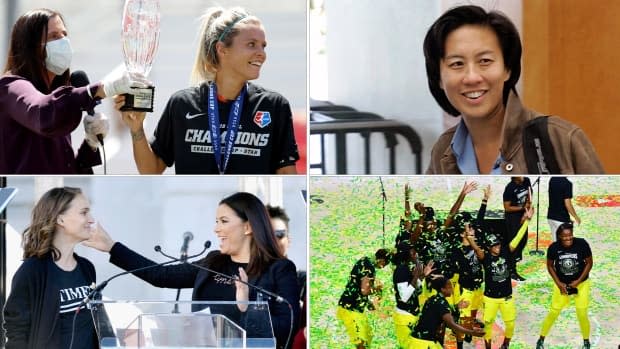
Eva Havaris has been through nearly everything in her 20-plus years as a Canadian sports executive. From being the only woman in the boardroom and a CEO at 30, to having people treat and speak to her differently because of her gender, it's been a journey with bumps and barriers along the way.
"It's only been the last few years that I've thought and reflected on that and for sure there's been challenges because of my gender," Havaris said. "Even when you do prove yourself, you still have to prove yourself. I find that's pretty consistent across the [sports] system."
Now the executive vice-president of strategy and operations/chief of staff for the Canadian Premier League franchise York FC, Havaris started the Leadership Mindset by Design, a combination of virtual one-on-one and group sessions to help emerging and established leaders reach their full potential in the sports and coaching worlds and beyond.
"I was there and didn't have someone that looked like me, that was relatable, to actually be a confidant for me and say 'hey wait, actually some of this stuff that's going on this is not you, it's the environment that you're in, it's some of the people and some of their own wounds and some of their insecurities,'" she said. "It took me years to figure that out."
One bright spot in the COVID-19 pandemic has been a spotlight on women excelling in leadership roles, particularly in government and health authorities. In the coaching and sports executive realm, there have been significant milestones, too.
As a Canadian example, Havaris had a short runway of two and a half weeks to pull together the 2020 Island Games for the CPL, which involved eight teams and 300-plus individuals over a six-week bubble in Charlottetown.

There are multiple other instances of women rolling up their sleeves when the going got tough and others being among the first to ever serve in their position.
WNBA commissioner Cathy Engelbert and the WNBA Players' Association collaborated on a landmark collective bargaining agreement, giving all players a livable wage, proper travel conditions and maternity benefits, to name a few. That on top of the heavy lifting the players did in fighting for social justice.
Lisa Baird took on the job of commissioner of the National Women's Soccer League just two days before the sports world came to a halt. In her first five months, she navigated a return to sport during a pandemic — it was the first North American pro league to restart — negotiated a landmark broadcast deal, secured big-name sponsors and announced a star-studded ownership group for expansion franchise in Los Angeles.
The aforementioned Angel City FC, owned by women tech entrepreneurs, Hollywood stars and Olympians, spawned other women athletes to step up into ownership groups, including four-time Grand Slam champion Naomi Osaka with the North Carolina Courage and U.S. hockey Olympic gold medallist Kendall Coyne Schofield and ESPN personality Sarah Spain with the Chicago Red Stars.
Kim Ng became the first woman to hold a full-time general manager role in any of the major men's sports leagues in the United States. She was chosen for the top job by the Miami Marlins after spending three decades with the Chicago White Sox, New York Yankees, Los Angeles Dodgers and Major League Baseball.
Becky Hammon became the first woman to coach a major American professional men's team in December when she ran the San Antonio Spurs bench after head coach Gregg Popovich was ejected during a loss to the Los Angeles Lakers. There are eight women coaching full-time in the NFL, including Maral Javadifar and Lori Locust of the Super Bowl LV champion Tampa Bay Buccaneers. The Red Sox hired Bianca Smith as a minor league coach, making her the first Black woman to serve as an on-field coach in baseball history.
"There's an adage: You can't be it if you can't see it," said Ng when she was introduced by the Marlins back in November. "Now you can see it."
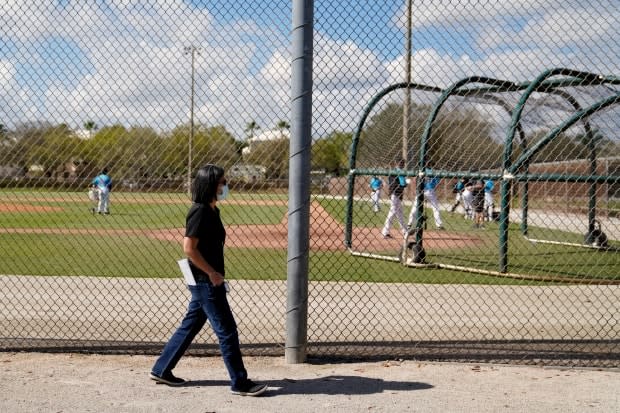
But despite all the high-profile firsts, there is still room to grow.
"Anecdotally it certainly feels like we're seeing progress in that there are some really visible examples of women gaining access to leadership spaces that women have been almost entirely excluded from historically," said Allison Sandmeyer-Graves, president and CEO of Canadian Women and Sport.
"What we need to stay awake to is that the success of one woman in this space does not necessarily mean there is the structural change that needs to happen for us to get to a place of real equity, where women are equally respected, and valued and hired and promoted and paid in those.
"Progress for sure, but we just need to be careful about celebrating it as if we've accomplished [balance] yet."
After a stellar soccer career at Western, Havaris went into sport management, first landing at Rugby Canada then spending the next eight years at national sport organizations such as Taekwondo Canada and Equestrian Canada. She got her first CEO job at the age of 30. In some of those early roles, she would look around the boardroom at people much older than her and as much as there were incredible people supporting her journey, she was still looking around for someone she could truly relate to. Her work now is helping women avoid some of the obstacles she faced.
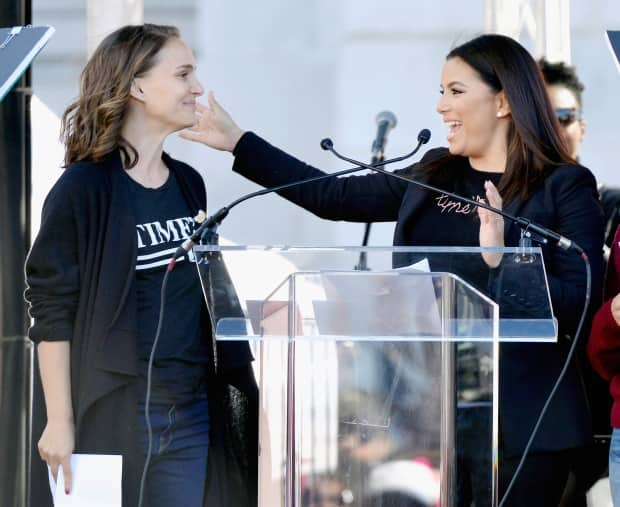
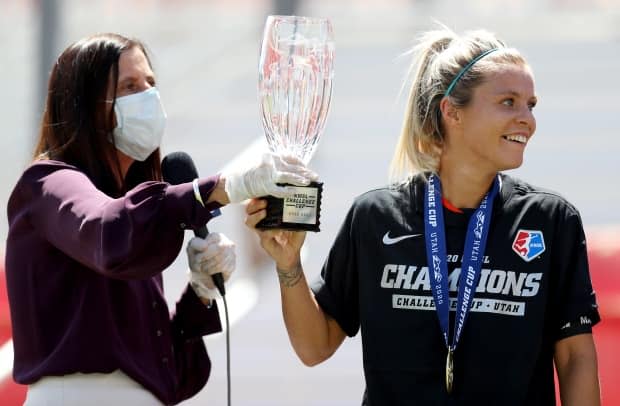
Limiting language
"It's saving people from going down a path or a hole or even before they see these [barriers] so they can be in their early 30s at an executive position just like I was 12 years ago," she said. "There's some things that I experienced that I know didn't need to be as difficult if I'd had a great confidant with me. And we're able to talk it through, do it in a safe place, put it all on the table."
What she hears most from the women in her groups is limiting language and the feeling that they can't use their voice. Things like 'I'm not confident' or 'I'm not your typical leadership type' or the feeling like they need to settle in their careers or they know where they want to go but feel like they can't fully express themselves to get there.
By diving into some of their often inherited negative thoughts and then their strengths, values and how they want to show up for others, that's when she says the 'aha moment' comes.
"That's when the boulders fall off of them," she said. "You can feel the weight just drop and go away and now they're just on fire, to show up exactly who they are."
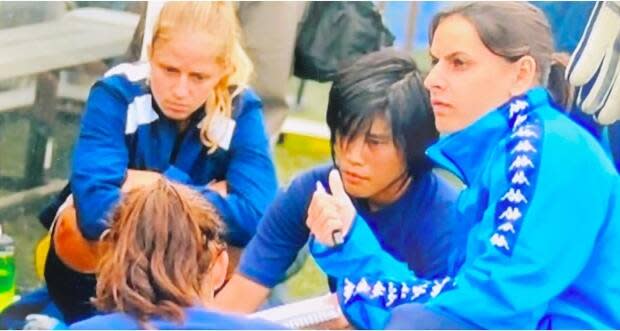
Poor representation
Increasing the numbers of women in sports leadership positions in Canada, especially in coaching, continues to be a challenge toward finding equity. One of the findings in Canadian Women and Sport's 2020 Rally report was poor representation of women in leadership roles.
"We do have a system where 75 per cent of coaches are men and in some sports it might be 100 per cent, so a lot of girls are growing up in a sport where all the experts, all the authorities in their sport that they can see, that are visible to them are men," Sandmeyer-Graves said. "So unless someone says to them, you'd be really good at this, have you thought about it, they will probably maintain an identity of a participant and never imagine themselves in another role in their sports.
"Having women in those daily training environments, as those authorities and those experts just subconsciously signals to girls that this is something that women do. That on its own can be very powerful."
Seika Hashimoto was recently promoted to president of the Tokyo Olympics organizing committee, replacing Yoshiro Mori after it was revealed he'd made disparaging remarks about women. One of her first moves was to appoint 12 more women to the seven who already sat on the 45-member executive board — changing the male-female ratio on the board from 80-20 to 60-40. Not equal, but a step in the right direction, and an example of how women in leadership positions can make an immediate impact for women who follow.
But for all the steps forward, Sandmeyer-Graves warns that diligence is required to prevent slipping back.
"In Canada there has been progress when it comes to women in senior leadership roles, the CEOs of our national sports and other major bodies like Own The Podium and the Coaching Association … We're creeping toward parity which is exciting, but our data last year showed that in some areas we started to backslide a little bit and so what we know is if we don't pay attention to this and make this a priority, progress can really quickly be unwound."
SHATTERED GLASS | CBC Sports reflects on International Women's Day:

 Yahoo Sports
Yahoo Sports 